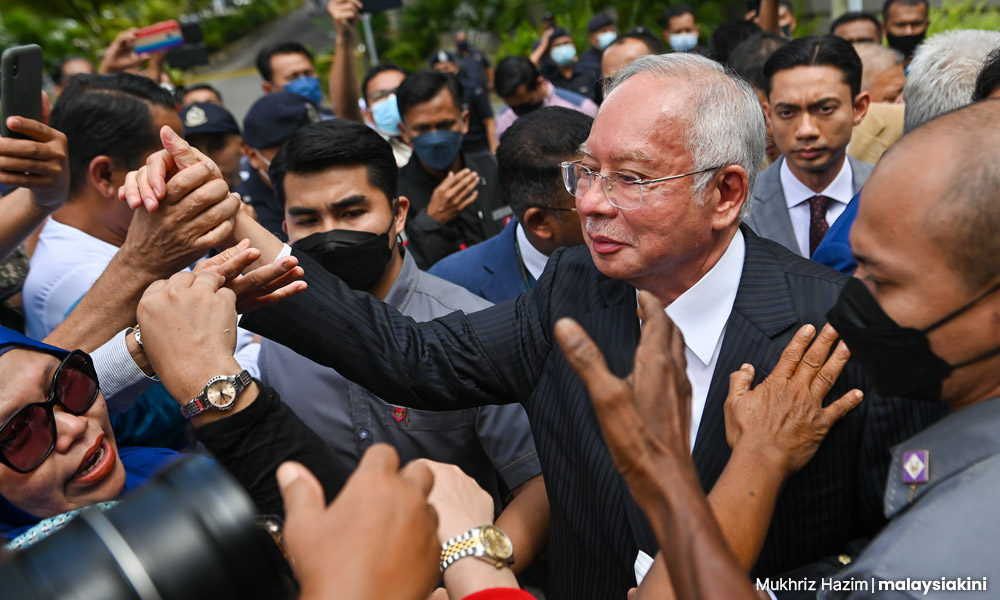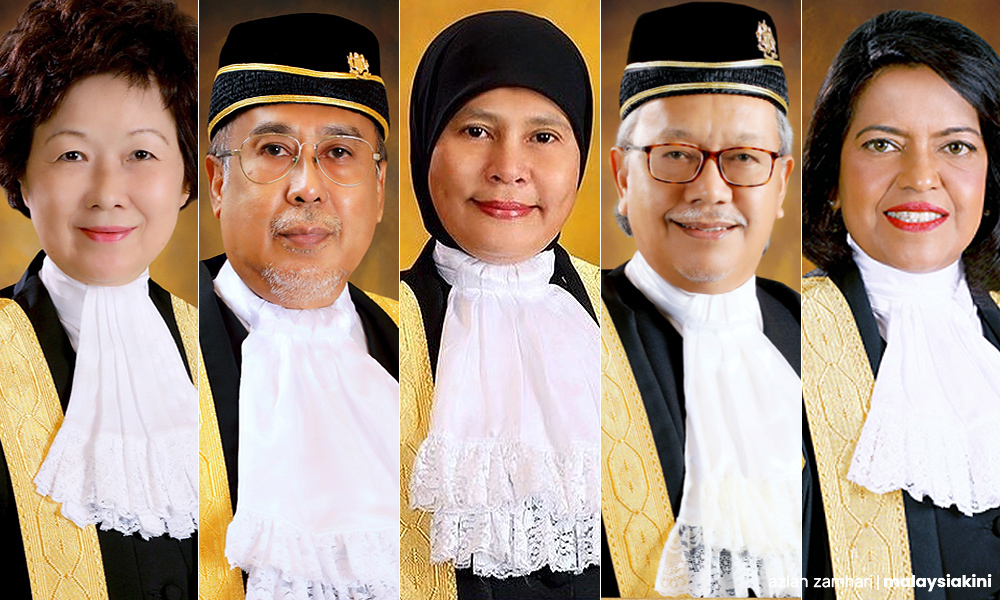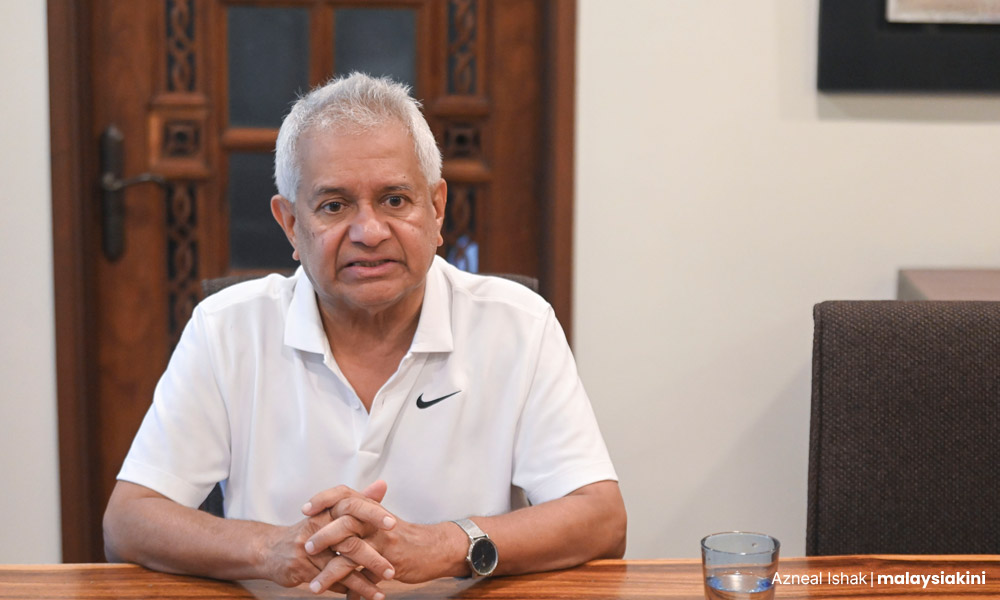EXCLUSIVE | The fourth and final part of an exclusive interview with former attorney-general Tommy Thomas, who initiated legal charges against former prime minister Najib Abdul Razak and others, delves into the complex area of pardons.
Malaysiakini: Let’s go to the problem of legal pardon. What would be the process for a pardon in Najib’s case?
Tommy Thomas: I’m glad you asked. There’s been so much disinformation out there. First of all, you must remember, pardon in Malaysia is set out in Article 42 of the Federal Constitution and it is perilous to compare it to other countries as it is a unique Malaysian mechanism.
There is a Pardons Board in all the states where the rulers chair it. We need only focus on the Federal Territories because the relevant court is the Jalan Duta Court. So the FT Pardons Board is chaired by the Agong, and the FT minister is a member. So are the AG and three or four members of civil society.
So basically, everybody who has been tried in the KL court comes under the KL Pardons Board. There are some 50,000 prisoners in our jails - convicted prisoners. All 50,000 of them are entitled to apply for pardon, under Article 42. There are practical problems: because if 50,000 were to apply, the Pardons Board would collapse, they cannot sustain it. So, there is a process built over decades since Merdeka. Essentially, you have to serve one-third of your jail sentence before you apply.
As required under the Federal Constitution?
I think it is more of a convention. Otherwise, there would be too many applications. It is just being practical. Every prisoner is to be treated equally. The FT Pardons Board meets three or four times a year traditionally. Each time they sit, they consider about 10 applications.
So let’s say in a typical year, they have 50 applications by 50 convicts. So the first problem is how do you become one of the 50. You can’t jump the queue. There is a waiting time. So Najib has to wait his turn, otherwise, you are unfair to other prisoners who had been waiting for years before submitting their applications.
Let’s next consider what happens when the Pardons Board meets. The whole idea of pardons is that the convict must show evidence, hence you need to be in jail for three or four years, to show that you have reformed. You have turned over a new leaf and you would not engage in criminal deeds. How do you prove that?
All convicts would say that they have reformed. The convict’s statement carries no weight because it is self-serving. So it is always backed by the parole officer, prison officer, hospital people, and many other independent sources. The more references you get, the better your case. All the references must point to the fact that you have reformed.
Then the third criterion is if you are a convict, and you apply, you cannot have other criminal cases. In Najib’s case, he has four other pending cases, two of which are very advanced. The audit trial is nearly completed. And the Tanore one has crossed halfway in the prosecution case. The other two have not started (RM27 million SRC money laundering case and the RM6.6 million IPIC criminal breach of trust case).

In all these cases, the prosecution has a very strong case. I expect the defence to be called. I expect Najib to be convicted. So you cannot be entertaining a pardon for offence number one when you have the other four cases pending. So it is not legally possible for him to put forward his application now. Just not legally possible. He does not pass muster to even submit an application at the present time.
The other possibility that Umno was thinking of is a review of the Federal Court decision. There is generally a high legal threshold to succeed in this. Wondering what’s the possibility for this?
Because of finality in litigation, the appeal must end at the apex court. In Malaysia, it is the Federal Court. The appeal ends there. Likewise, in the Supreme Court in England, Supreme Court in India, and so on.
A slight change occurred because of the (Chile’s military coup leader Augusto) Pinochet case 25 years ago when Lord Hoffman, in the House of Lords, was accused of being biased as his wife was part of Amnesty International. So, what became known as the Pinochet exception allowed a final court to review an appeal of a decision of its own court. That is how it started.
And most of the apex courts followed Pinochet, but they kept the window of review very narrow. It had to be on truly exceptional grounds. Malaysia accepted the Pinochet exception about 15 years ago. So, a lot of lawyers applied and I think if there have been 100 review applications in Malaysia in the last 15 years under Rule 137, I would say 99 percent of the cases have been rejected. So it is really one of those paper rights which are invariably dismissed by the court.
The threshold is incredibly, incredibly high. There are two stages. First, the leave, and then the “review hearing” proper. Here in Najib’s SRC case, the problem is everything that happened was self-inflicted and self-induced by the lawyers whose actions and omissions bound Najib. Indeed, suicidal or kamikaze conduct. After engaging voluntarily in such conduct, it does not lie in their mouths to say “Can we have a review?”
A review judge would say “why did you not argue all this before the Federal Court?” In my opinion, a review is absolutely doomed to fail.
I was thinking about the concerns you have that judges are sometimes afraid to rule against high-profile politicians because they fear a (former Lord President) Salleh Abas reprisal for themselves. When something like the SRC conviction happened, how much do you think this would encourage other judges to do the same?
I think there is a psychological effect - people forget the human element in courts all over the world. So the psychological impact of the Federal Court decision is tremendous and it boosts the administration of justice. And the calm and measured way the chief justice dealt with what I call silly and frivolous applications was first class. She was cool under pressure, never lost her temper, gave the defence time, and made all the correct decisions. The five judges’ decision was a collective one, the chief justice was the spokesperson.

So the Federal Court did brilliantly, and it should act as a great psychological boost on all the other judges because these are our five senior judges. So if you were a magistrate or High Court judge, you would be inspired, and say “Oh, the head of the judiciary and the four senior members did this, so I too can do it.” It is wonderful and inspirational.
It would appear, then, that Najib had jeopardised his own chances for a pardon in the future by his conduct. His biggest obstacle is that he has four pending criminal cases.
Even if he didn’t have the four pending cases, by obviously not showing that he has reformed…
Exactly. You see, they would ask for documents and proof to show that you have reformed. He has not even been in jail for one week (at the time of the interview). Reform is after you served jail time. Because if you’ve been convicted for rape or kidnapping or murder, or even for small (offences) like stealing bread from the market and you get two years, you can also apply for a pardon.
In each case, you must show reform and contrition. (The convict) often show that they performed extra work, that they helped in the kitchen of the prison, they did charity, they worked in the garden, they helped other fellow prisoners, they took steps to reform and it was attested by others. By definition, that means a substantial period of time in prison.
Can the king proceed with his pardon without (the Pardons Board)?
No, His Majesty sits on the Pardons Board. He always chairs it. The procedure is set out in detail in Article 42.
I can’t help but feel the defence arguments throughout the three levels of court were not very strong. How would you argue the case if you were the defence counsel in the SRC trial?
I would have advised him to just plead guilty. I’ve handled a number of civil cases where there were weak arguments, and we tell clients, “Look, we will not succeed”. That is one good thing about the law - it is predictable. In many ways, the law is reliable, certain, and the law encourages settlement. And to get some idea of how the case would turn out, go see good lawyers who can “read” the court and the lawyers would say, “Please don’t waste your time”. That is why all over the world, the accused plead guilty, or parties consent to judgment.
Like (former Goldman Sachs banker) Tim Leissner did. But Roger Ng (Leissner’s former Goldman colleague) thought he was very smart, and look what happened to him. Many people plead guilty because the criminal bar in those countries tells them, “Look, on this, you would lose”. But in Malaysia, it does not happen at all or not often enough.
On the Arab money (argument), can I just say that it was very clear to us, and we proved it, particularly for money laundering, the source and the destination of the money. The source of the money was SRC. In law, it does not matter where SRC got the money, but of course, SRC got the money via a loan from KWAP (Civil Services Pension Fund), so KWAP paid RM4 billion into SRC’s account. SRC was flushed with funds, of which RM42 million, through disguised payments, ended up in Najib’s account as the final destination.

There can be no doubt about that. Of course, we had to prove that. That was the first element (to prove) and we called witnesses, supported by contemporaneous documents. The paper trail was complete. Three courts were satisfied.
What does that imply when Najib swore in the mosque that the RM42 million was a donation from the Arabs, the only conclusion we can come to is that he was lying?
But that has got nothing to do with SRC. In other words, my lawyers’ argument was that we were the prosecutors, it was already established by documents and witnesses that the RM42 million came from the RM4 billion (KWAP loan). It was SRC’s money, we could show that and that was all we needed to establish in law.
Najib gave his version and we cross-examined him for two weeks. The judge was satisfied that our case was established. So once our case was established, everything in the defence falls. It does not matter what story he puts forward; the courts accepted our version of the story as the truth.
So, from a legal point, is that all you are required to prove?
Yes, but that is the first ingredient.
The worrisome thing now is you have a group of top Umno leaders from the president, deputy president, the secretary-general, and a number of them below who actually urged all Umno members to petition the king for a pardon. Is there a way at all that they can use the process to grant pardon to Najib?
If you are in the business of petition-writing, then equally there are those who want him to stay in prison, they can also have a petition. And if you want to get public opinion, why not do a referendum or plebiscite? I suspect that if that is done, out of the 30 million people, a large majority would want him to serve prison time. But all that is not relevant to the exercise of pardon from a legal point of view, which I just explained.
So you are saying a pardon is next to impossible?
Yes, for the legal reasons I gave, at least at the present time.
Any final words you wish to add?
I think Malaysia should be proud of this (SRC conviction). If you look at the history of the 20th century and 21st century, in the last 120 years, if you asked the question “How many countries have a system where the prime minister or president was defeated in a general election and was then charged in the ordinary courts of the land (not a coup d’etat or shot) presented his defences and then appealed, and finally he was found guilty and he started serving his sentence?”, Malaysia stands out and we should be proud of it.
One example that comes to mind is India, with Indira Gandhi’s Emergency. When the Janata coalition won in 1976, everybody expected (the new government) to charge Indira because she abused the emergency. She was a dictator and Janata was in power longer than Pakatan Harapan. They were there for three years. The attorney-general did not charge her. Instead, they had an ineffective commission called the Shah Commission. It was a waste of time. That was an opportunity lost, and India always holds itself out as a mature political system.
Look at Israel, when (Benjamin) Netanyahu was prime minister. They said, well, he’s prime minister, it’s very difficult (to charge him), even his own AG said he should be charged. He is no longer prime minister, and the case has not started. Israel also holds itself out as more mature than us.
The only country I know of (that is similar to Malaysia) is South Korea. But South Korea is not a common law country. The differences are too great. South Korea went through a period where almost every retired president was charged. Then they realised it was bad for the body politic because nobody wanted to be president. I believe such prosecutions have since ceased in South Korea.
And finally, (former US president) Donald Trump!
Accordingly, we should be proud of the fact that we did put Najib in jail, and the country remains stable, he went to jail and the sun continues to shine and people carry on with their ordinary lives. The nation is so stable despite all this noise and that is fantastic. Malaysians can hold their heads up.

Would all of this have happened if Harapan did not come to power?
For credit, the voters of Malaysia were following the 1MDB scandal in 2016, 2017, and 2018 before GE14. They were convinced by Dr M’s (Mahathir Mohamad) simple explanation of ‘pencuri, pencuri’. And 52 percent of voters voted for Harapan, resulting in a change of government. These voters very much know that 1MDB was the main reason. No voter who voted Harapan would say they didn’t know about 1MDB or ‘Najib pencuri’. So, the voters wanted it.
Mahathir became PM, he appointed me and then left me alone. I charged Najib. I was allowed to appoint top lawyers in the country, together with experienced DPPs (deputy public prosecutors), and the courts found in favour of the stronger case. You must also credit my successor (Idrus Harun) who did not disturb any of these things, or remove the lawyers we appointed. He carried on with the process, so you must congratulate him. And you must congratulate the two prime ministers (Muhyiddin Yassin and Ismail Sabri Yaakob) who followed Mahathir as they continued the process. And finally, the nine judges.
So, I would say it was a convergence of many factors in the last six years that resulted in this happy state. Everybody should be proud of that. The noisemakers in Umno are a really small minority. - Mkini



No comments:
Post a Comment
Note: Only a member of this blog may post a comment.